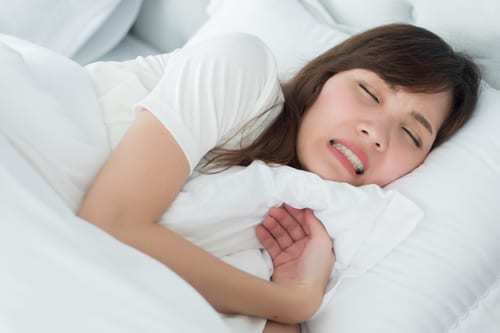Some people talk in their sleep, walk in their sleep, or even eat in their sleep. While researchers are unclear about what causes these sleeping habits, they have a pretty good idea of what causes another troublesome nocturnal activity: bruxism, also known as teeth grinding. While a bedfellow with disrupted sleep might fill you in on the fact that you’re a teeth grinder, learning the causes and symptoms of teeth grinding can help you identify the habit early.

Symptoms of Teeth Grinding
Tight Jaw, Facial Pain, and Headaches
Open your mouth wide and move your bottom jaw around. While you might look a bit silly doing this, it is a good way to assess whether or not your jaw muscles feel tight. A stiff jaw could be a sign that you grind your teeth at night, which can lead to temporomandibular disorder (TMD). TMD makes chewing and talking painful. Occasionally, symptoms of TMD resolve on their own, but sometimes surgery is necessary. If your jaw feels tight, try giving it a massage using a constant, circular motion. However, don’t press too hard.
Teeth grinding can also make other muscles in your face feel tight. When you grind your teeth, you clench other parts of your face. Just like a workout, this can make your muscles feel very sore. The built-up tension in your face may lead to frequent headaches, which is one of the most common symptoms of teeth grinding.
Sensitive, Worn, and Damaged Teeth
If it seems like you’re getting filling after filling replaced and you’re cringing at the idea of ice cream touching your teeth, there’s a good chance you grind your teeth. Teeth are very strong, which is why we are able to chew thick meats and bite into apples. However, strong teeth can damage strong teeth. Grinding your teeth together at night creates friction, which wears down your enamel and any previous dental work you’ve had. Your enamel protects the nerves of your teeth, which is why when you wear down enamel, your teeth become more sensitive to hot and cold foods. Worn fillings can also expose the tiny nerve fibers in your teeth. If your teeth are in pain and you are also experiencing frequent headaches and jaw stiffness, contact your dentist right away.
What Causes Tooth Grinding?
You’ve read about the symptoms of teeth grinding, but now it’s time to fill you in on the causes:
- Stress and Anxiety: Clenching your teeth is a natural reaction to something that is unpleasant or stressful, and sometimes those feelings can follow you into your sleep (just think of stress dreams). In fact, studies have shown emotional instability can cause you to grind your teeth at night.
- A Misaligned Bite: An overbite or underbite could be causing you to grind your teeth. Luckily, orthodontists can correct these problems using treatments like Invisalign and traditional braces.
- Stimulants and Depressants: While the debate continues regarding whether or not coffee and wine are actually good for you, one thing is for sure: Research shows that consuming too much coffee or alcohol can lead to grinding your teeth. You might want to avoid these beverages if you struggle with bruxism.
Do you think you may grind your teeth at night? Consult with your dentist about the symptoms you are experiencing, and together you can come up with a treatment plan to ease the pain and protect your teeth. Your dentist might recommend that you wear a mouth guard at night or receive an orthodontic treatment to correct a misaligned bite.
If you’re looking for an experienced, reliable, and friendly dentist in Springfield, Missouri, contact Wilkinson Dental. Dr. Wilkinson and his team will give you the personalized treatment you deserve using state-of-the-art technology. Schedule your first appointment today by calling 417-708-0556 or request an appointment online. We look forward to hearing from you!